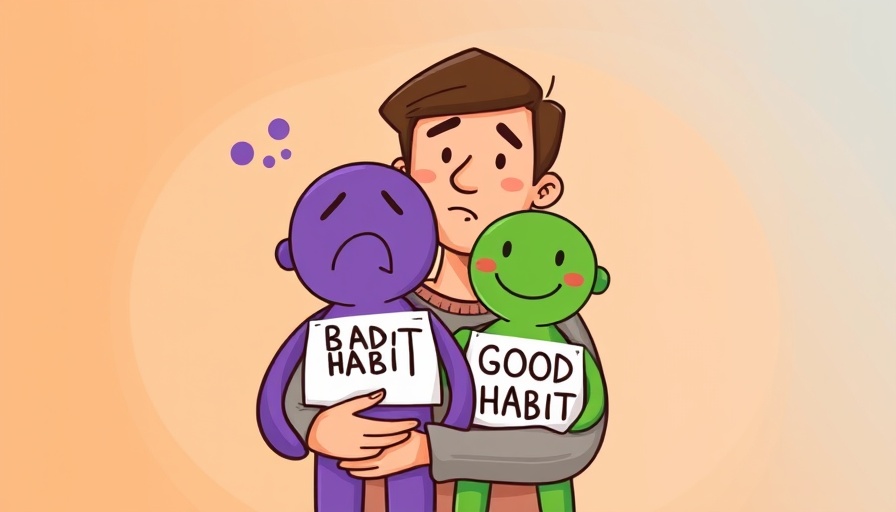
Embracing Acceptance: A Fresh Take on Bad Habits
We all have those pesky habits—the ones that pop up at the worst times, pulling us away from what truly matters. The struggle to break these habits often feels like an uphill battle where willpower alone doesn’t suffice. Yet, what if the key to changing what we perceive as ‘bad’ habits lies not in forceful rejection but in acceptance? As I recently experienced, acknowledging these habits can be a powerful step toward transformation.
Understanding the Habitual Cycle: The Struggle is Real
In my own life, I battled with excessive smartphone usage, which often replaced meaningful connections with mindless scrolling. A dinner conversation with my husband made me realize the impact of my distraction. I thought that deleting social media apps would solve the problem, but the relentless urge to check my phone persisted. The craving I felt after uninstalling the apps represents what psychologists call an “extinction burst”—the increased behavior that occurs after attempts to suppress a habit.
This experience mirrors many others who face similar challenges, whether it’s sugary snacks, procrastination, or even excessive television watching. We often try to fight against our habits loudly and forcefully, but in doing so, we may inadvertently amplify our urges and feelings of failure.
Acceptance: A Shift in Perspective
While researching ways to cope, I discovered the profound concept of acceptance. Rather than labeling my habit as a failure, I learned to view it through a lens of compassion. Acceptance isn’t about giving up; it’s about acknowledging our habits without judgment. When I began to accept my urge to use my phone rather than vilifying it, I noticed a significant reduction in anxiety around my behavior.
This mindset allows us to realize that habits don’t define us; they simply exist as part of our experience. This realization has a liberating effect, reminding us that understanding our behaviors takes time and patience.
Practical Steps to Foster Acceptance
1. Create Space for Observation: To start my journey, I began observing my phone usage patterns with intention. I used mindfulness techniques to identify the triggers that propelled me to seek my device. Journaling became my outlet for tracking emotions and needs, highlighting moments of loneliness or boredom that prompted my habitual behavior.
2. Change Your Narrative: Instead of criticizing myself with “Don’t use your phone,” I adopted a gentler approach, saying, “Not now.” This shift acknowledges the urge while providing a compassionate framework. Acceptance of the desire without condemnation can significantly alleviate the internal battles faced.
The Power of Mindfulness in Changing Habits
Mindfulness practices deepen self-awareness, and they are vital in transforming habits. Through meditation and breathing exercises, I foster a sense of calm to deal with cravings. When distractions arise, I can take a moment to breathe while exploring the underlying emotions driving my urge. This not only helps in managing my smartphone use but also equips me with tools for addressing other habits, from eating to emotional reactions.
Inspiring Perspectives on Habit Transformation
We often hear evaluation-based narratives around habits, but they can be debilitating. Instead, consider the journeys of those who've embraced acceptance. For instance, people overcoming addiction can attest to the transformative power of acceptance, leading to profound personal growth. Research highlights that acceptance and commitment therapy (ACT) effectively empowers individuals to face their challenges, putting them in control of their narratives rather than letting the habits hold them captive.
Finding Freedom in Acceptance
In embracing acceptance, we open ourselves to exploring alternative layers of our experiences. Our attempts at changing habits invite us to understand our needs better, whether emotional fulfillment, stress relief, or the desire for social connection. With self-compassion, we may even find unique paths to enjoyment outside of our habitual behavior.
Call to Action
Reflect on your habits and try employing acceptance in your journey toward change. Identify a habit you wish to alter and sit with it without judgment. What emotions does it evoke? How can observing it without condemnation support your journey? Embrace the opportunity to know yourself better and uncover paths that lead to enriching transformation!
 Add Row
Add Row  Add
Add 



Write A Comment